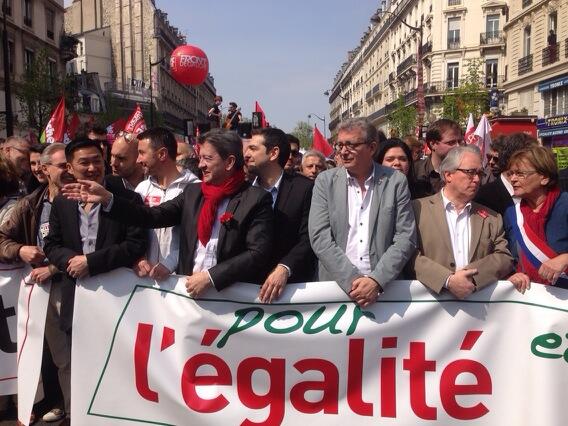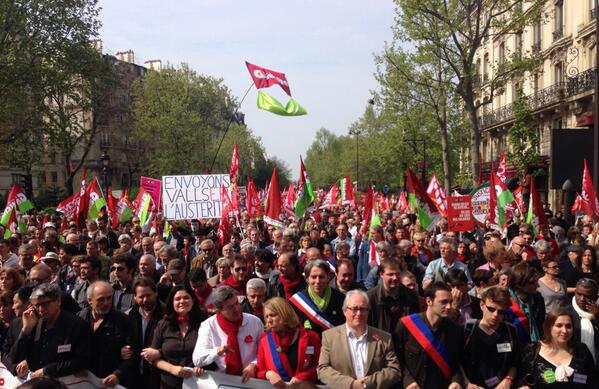Greece, guinea pig of a neoliberal experiment
- Details
- Category: #EP2014
- Published: Thursday, 15 May 2014 14:29


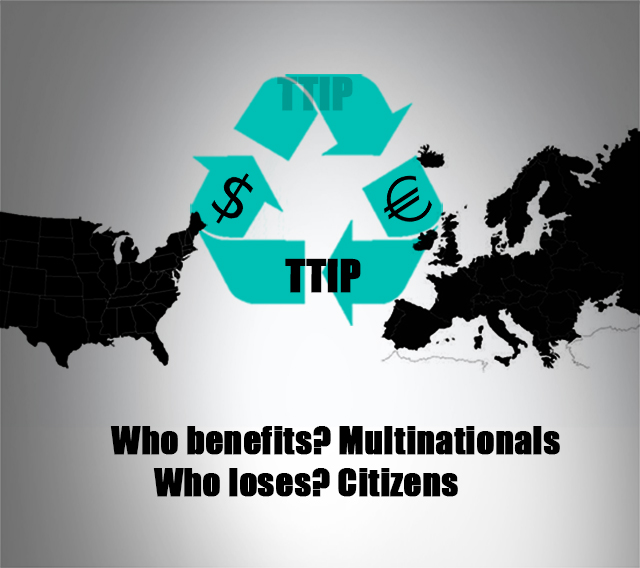

What is TTIP?
The Transatlantic Trade and Investment Partnership (TTIP) is a trade agreement that is presently being negotiated between the European Union and the United States. It aims at removing trade barriers (tariffs) across economic sectors to create a single market between the EU and US.
Lobbyists on behalf of multinationals are aggressively pushing for TTIP to be signed, claiming that new jobs and economic growth will result. However, a review of TTIP exposes the myths.
A review of TTIP by the Austrian research institute Austrian Foundation for Development Research (OFSE)* has found:
Multinationals have used the ISDS mechanism in other instances, to sue governments before secretive arbitration panels, effectively bypassing the courts and the will of Parliaments. Governments could end up having to pay compensation to multinationals using taxpayers’ money.
*Study commissioned by GUE/NGL
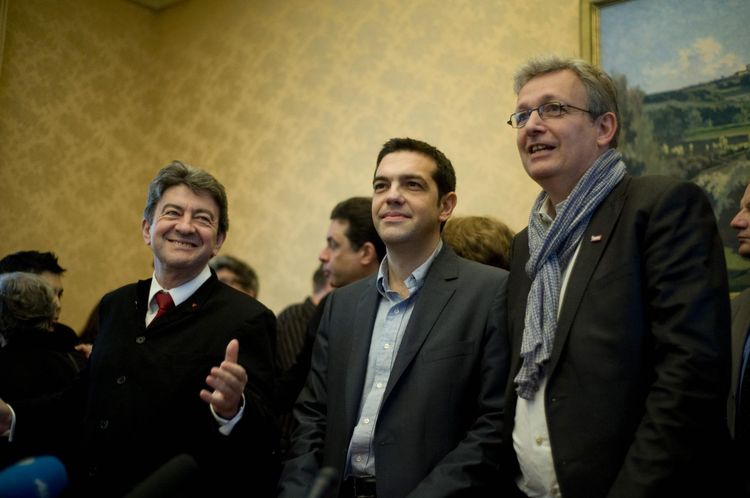
Jean-Luc Mélenchon speaks about the key issues of the Front du Gauche regarding the European elections.

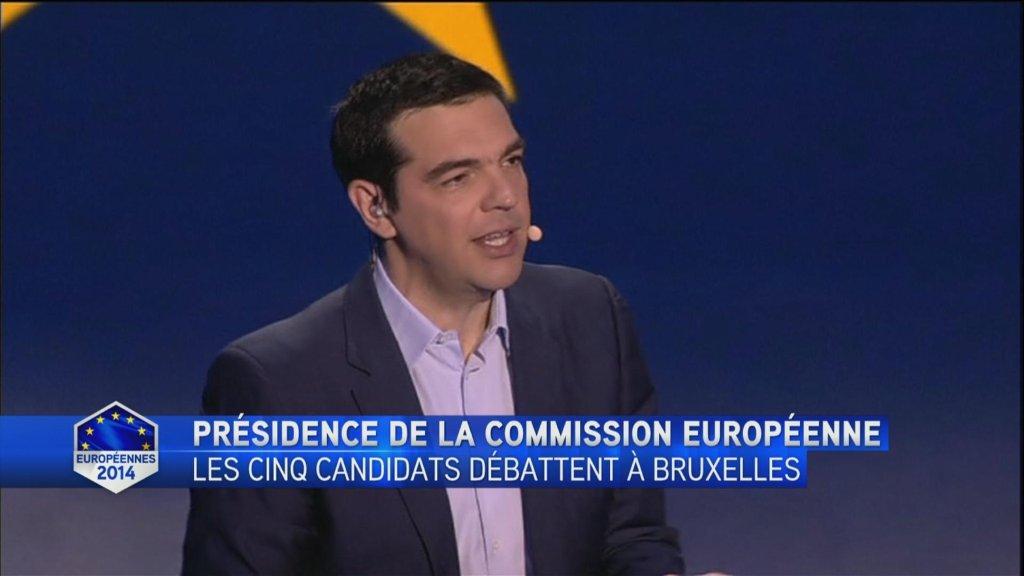
On Thursday, May 15 Alexis Tsipras participated in the official Eurovision debate between the presidential candidates for the European Commission. Tsipras, the candidate of the European Left, added a much needed fresh perspective, capturing the attention of citizens across Europe. He was the most tweeted leader according to Eurovision’s analysis, trumping Martin Schulz (PES), Guy Verhofstad (ALDE), Jean-Claude Juncker (EPP) and Ska Keller (Greens).
Citizens were called to participate in the EBU debate using social media, and specifically by submitting questions and thoughts using the hashtag #TellEurope.
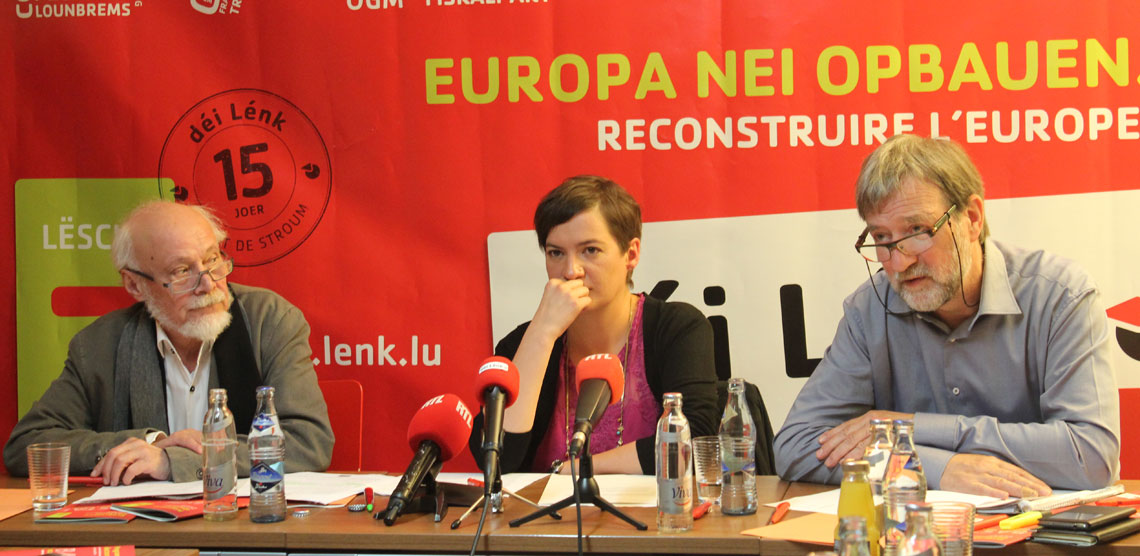
Dei Lenk is the Left party in Luxembourg, and member of the European Left.
See more here: http://www.dei-lenk.lu/de/les-enjeux-des-elections-europeennes/
AGENDA D’URGENCE EN 12 POINTS: POUR UNE DYNAMIQUE DE RECONSTRUCTION DE L’UNION EUROPEENNE
1. Annulation des derniers pactes d’austérité renforcée: six-pack, two-pack, „pacte fiscal“ (TSCG). Remplacement du MES avec sa « conditionnalité » de réformes dites structurelles, par un vrai pacte communautaire de solidarité; fin de mission de la Troïka ; clause de non-régression sociale et écologique.
2. Programme d’urgence contre la pauvreté et le chômage : salaire social et revenu garanti minimum dans tous les Etats-membres selon des paramètres permettant une vie décente.
3. Audit des dettes publiques annulation / restructurations (partielles).
4. Agenda pour la réduction des inégalités : a) pour la convergence sociale: relèvement substantiel de la part des salaires dans le PIB comme grande orientation prioritaire; définition d’un Etat social européen, avec revalorisation de la sécurité sociale publique et du droit du travail ; b) pour la convergence fiscale et une fiscalité fortement redistributive : Relèvement substantiel et concerté des taux sur les profits, les hauts revenus et les grandes fortunes ; introduction rapide de la TTF.
5. Subordination explicite dans les traités des « libertés économiques » aux droits sociaux.
6. Programme de reconversion écolo- énergétique de l’économie, contre le réchauffement climatique et l’épuisement des ressources.
7. Programme de démocratisation : renforcer le pouvoir législatif du Parlement Européen et ses liens avec les parlements nationaux ; élargir les moyens d’intervention des citoyens /citoyennes de l’Europe.
8. Extension des droits des salarié/es et de leurs syndicats dans les entreprises et les groupes économiques.
9. Réforme de la BCE: sa mission englobera l’emploi et le développement social et écologique ; cette mission fera l’objet d’un contrôle et d’un débat démocratique; elle prêtera directement aux Etats à des taux supportables.
10. Création immédiate d’une banque publique européenne pour collecter l’épargne et assurer le crédit pour les PME, pour la reconversion écologique et le renouvellement des infrastructures (emplois!!!).
11. Annulation des directives de libéralisation et charte des services publics.
12. Augmentation des moyens de l’Union Européenne : Budget de 5% au moins du PIB européen, financé notamment par un impôt européen progressif sur les grandes fortunes, permettant le financement du développement social, augmentation substantielles des fonds structurels pour aider les régions les plus pauvres (au lieu de les soumettre aux mesures destructives de l’austérité). ET : TTIP – arrêt immédiat des négociations ; publication de tous les documents afférents.

Teodoro Andreadis Synghellakis, l'huffingtonpost | Pubblicato: 06/05/2014 14:30 CEST | Aggiornato:06/05/2014 15:38 CEST
Alexis Tsipras, il trentanovenne leader della sinistra greca, è sicuro che il suo partito, Syriza, vincerà le prossime elezioni europee, riuscendo a provocare un “effetto a catena positivo” in tutta Europa. “L’Euro della signora Merkel non è una strada a senso unico”, sottolinea Tsipras in questa intervista concessa all’Ηuffington Post. Gli ultimi sondaggi danno il suo partito al 21,5% delle intenzioni di voto, mentre il centrodestra è al 18,1%.
Secondo il leader greco, la vittoria di Syriza “sarà la vittoria di tutti i popoli europei” e i nuovi memorandum di austerità saranno carta straccia . Rivolgendosi a Matteo Renzi, Tsipras sottolinea: “I suoi ottanta euro sono una goccia nel mare dell’austerità”.
Se riuscirete a vincere le elezioni europee chiederete, in Grecia, elezioni politiche anticipate?
Alle elezioni europee saremo certamente il primo partito. Verrà confermata la distanza tra le scelte del governo e la volontà del nostro popolo. Ciò significa che continuare con l’austerità, con qualunque alleanza di governo, vorrebbe dire ignorare la volontà del popolo, violare chiaramente il principio della sovranità popolare.
Crede ci siano spazi, oggi, per “l’Euroscetticismo costruttivo” da voi propugnato? Non c’è il rischio che venga tutto monopolizzato dallo scontro tra l’austerità della signora Merkel e forze come il movimento di Grillo che chiedono il referendum sull’Euro?
Non sosteniamo nessun euroscetticismo, sosteniamo solo la prospettiva di un’altra Europa. La nostra Europa è molto più vicina al progetto politico e alla visione dei suoi fondatori, che non all’Europa neoliberale di oggi, della signora Merkel. È ovvio che la Merkel è contenta di avere come avversario Beppe Grillo e non la Sinistra Europea, perché, con le sue posizioni, Grillo è un avversario politico molto più semplice da affrontare. Noi dimostriamo che l’austerità non si deve identificare con l’Euro e che l’Euro della signora Merkel non è una strada a senso unico.
Come giudica l’iniziativa che ha portato, in Italia, alla creazione della lista “L'Altra Europa con Tsipras”? Ed è vero che verrà a Roma per la chiusura della campagna elettorale?
La capacità dei cittadini di organizzarsi autonomamente dà significato alla Democrazia. Prima o poi, la mobilitazione della società in favore del cambiamento politico e sociale, per una Europa e un’Italia progressista, porterà al cambiamento. È stato gettato il seme, certamente germoglierà. Le elezioni Europee sono un primo passo indicativo. È certo che ci ritroveremo in Italia nell’ultima settimana prima delle elezioni. Devo ammettere che il mio tour politico nelle capitali europee non poteva concludersi in modo migliore!
Molti la vedono come il nuovo forte punto di riferimento della sinistra europea. Se andrà al governo quale sarà la prima iniziativa?
La nostra prima mossa sarà il disconoscimento di tutti gli obblighi-palesi e non- contenuti nel nuovo memorandum firmato dal governo greco di coalizione. Non avranno più valore i nuovi tagli di stipendi, pensioni, e i licenziamenti di 11.000 dipendenti pubblici programmati sino a febbraio del 2015. La conquista del governo da parte del popolo e di SYRIZA, in Grecia, costituirà una vittoria per tutti i popoli d’ Europa. Una vittoria per tutti i cittadini che bocciano l’austerità come presente e futuro dell’ Europa e sono preoccupati per l’arretramento della democrazia, indipendentemente da dove vivono. Nel maggio del 2010, la Grecia, usata come cavia della crisi, ha provocato una reazione a catena, negativa, in tutta Europa. Con la vittoria di SYRIZA, ci sarà una reazione a catena positiva.
Come vede la mossa del governo Renzi, che ha deciso dare ottanta euro al mese ai dipendenti con stipendi sino a 25.000 euro lordi l’anno? È una misura di sinistra?
Non esistono singole misure di sinistra. Sono una goccia nel mare, nell’oceano dell’ austerità di trentaquattro miliardi di euro, annunciata dal governo Renzi per i prossimi tre anni. Una politica che, tra l’altro, ha ricevuto il plauso di Angela Merkel. Il vostro presidente del consiglio constaterà presto che l’aumento impressionante del rapporto tra il debito pubblico e il Pil greco- a causa dell’ austerità- non è un fenomeno isolato. L’accumularsi dei prestiti non si risolve con l’austerità, ma con una vera ristrutturazione del debito, con un “Vertice Europeo per il Debito”, come quello tenutosi a Londra nel 1953, a favore della Germania.
Alexis Tsipras sarà in Italia il 19 maggio per chiudere a Bologna in piazza Maggiore la campagna elettorale della lista che lo sostiene
Originally published: http://www.huffingtonpost.it/2014/05/06/alexis-tsipras-europa-merkel_n_5272221.html?utm_hp_ref=italy

From Fabio Amato, Luca Casarini, Raffaella Bollini, Tommasso Fattori – candidates for the European Parliament with ANOTHER EUROPE WITH TSIPRAS (Italy) – Harris Golemis, Natassa Theodorakopoulou, Giannis Bournous – candidates for the European Parliament with SYRIZA (Greece).
We, signatories of this appeal, have been friends and comrades since the late ‘90s. We have the same views on social transformation in our countries and the reconstruction of Europe with the common struggle of Left parties, labor unions and social movements. We've participated in marches throughout Europe, the movement against globalization, the World and European Forum, Florence 10+10, and the Alter Summit. As candidates in the upcoming election for the European Parliament, we call upon all progressive people in Europe to vote for the lists in Greece, Italy and all the European countries that support Alexis Tsipras’ candidacy for President of the European Commission.
Fabio Amato is responsible for International Relations of the Communist Refoundation Party, member of its National Political Committee, and moderator of the election campaign of the ELP. He was one of the leading figures of the euromarches in Italy, took part in the Genoa Social Forum, and today is active in the antiwar movement and the movement of solidarity to Palestine, the Kurdish people and Latin America.
Luca Casarini comes from Italy’s Social Centres and has fought for the Commons and the environment. He was one of the leaders in the Disobbedienti movement and the anti-globalization movement, and takes part in the movement for the closure of immigration detention centers in Italy and the struggle against importation of GM products into Europe.
Raffaella Bollini is a member of the National Board, International Relations moderator and in charge of the “Commons” in the ARCI organization. She’s active in the anti-racist movement and in the peace movement. She is a member of the International Board of the World Social Forum, the Executive Committee of Euromed Network for Human Rights, and the Alter Summit Organizing Committee.
Tommaso Fattori is a founding member of the Italian Forum of Water Movements and one of the promoters of the successful referendum against the privatization of water in 2011. He participates in the organizing Committee of the World Alternative Water Forum, in the Climate Forum, and Alter Summit. He is the director of Transform! Italia and is active in the European Network of Political foundations.
Originally published: http://left.gr/news/koini-ekklisi-gia-tis-eyroekloges
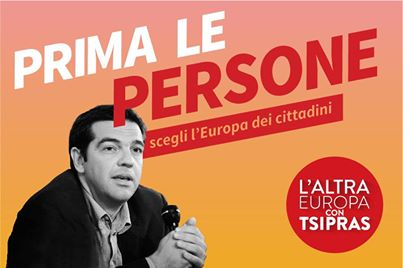
Learn more about "L'Altra Europa con Tsipras"
The Other Europe with Tsipras (L'Altra Europa con Tsipras) is a Left electoral list in Italy for the 2014 European election in support of Alexis Tsipras, the candidate of the Party of the European Left for President of the European Commission.
The Other Europe was founded on 5 March 2014 in Rome and is composed by individual citizens, associations and parties:

The ten richest people in Italy now own as much wealth as almost 500,000 working class families put together. A little less than two thousand wealthy Italians, members of the super-rich club, have total assets of more than €169 billion (excluding the value of property).
“The wealth gap has grown,” according to research centre Censis.
It finds that a company executive owns 5.6 times more assets than a worker, compared to approximately three times twenty years ago.
Those working in the liberal professions, like lawyers, doctors and accountants, are worth 4.5 times that of a worker (4 times twenty years ago). An entrepreneur is worth more than 3 times that of a worker (2.9 times twenty years ago). “
And those with the least have lost the most over the past two decades. Compared to twelve years ago, the annual family incomes of blue collar workers have fallen in real terms by 17.9 %, those of white collar workers by 12% and those of employers by 3.7 %, while the incomes of executives have increased 1.5%.
How rich you are also affects your life in other ways, Censis found. Having children doubles the risk (15.7%) of ending up in debt over your mortgage, rent and utility bills, compared to couples without children (6.2%). For single parents the risk of ending up in poverty or debt increases by a third, compared to couples with children (26.2% vs 19.3%).
Regional inequalities are growing too. The risk of ending up in poverty for residents in the south of Italy (33.3%) is three times higher than those in the north (10.7%) and twice as much as those of central regions (15.5%). In the traditionally poorer mezzogiorno (18%) residents are also at almost double the risk of ending up in debt than in the north (10.4%) and five percentage points higher than those in the center (13%).
It may be significant that over the past twenty years examined by this research Italy has implemented a massive squeeze on public spending, large scale withdrawal of the state in the economy and privatisation, successive deregulatory labour reforms including the abolition of the indexation of wages to inflation (scala mobile) and ever closer integration into the EU, in particular giving up monetary and fiscal sovereignty to unelected officials in Brussels and Frankfurt.
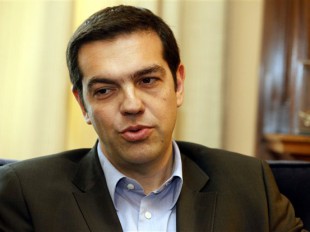
(Extraits de l’interview de la journaliste suédoise Kajsa Ekis Ekman avec Alexis Tsipras. 16 avril 2014)
Alexis Tsipras est à la tête d’un parti soutenu par un tiers des électeurs dans son pays. Il est le candidat de la Gauche à la Présidence de la Commission Européenne. « Le destin de la Grèce est inséparable du destin de l’UE. », déclare Tsipras. « Maintenant la Gauche s’organise pour résister ! ».
Les média suédois ont tendance à se concentrer sur la montée du parti néo-nazi « Aube Dorée » en Grèce, cependant la majorité des citoyens qui n’ont pas à manger ne sont pas intéressés par le nazisme.
Au contraire, on constate aujourd’hui en Grèce l’émergence de la Gauche. Les syndicats et la société civile ont apporté plusieurs fois leur soutien à la Gauche lors des dernières manifestations qui appellent à en finir avec l’austérité.
La coalition de gauche radicale grecque, SYRIZA, emmenée par Alexis Tsipras, est devenue la plus solide d’Europe. Cette mouvance regroupe des socialistes, des écologistes, des féministes, la société civile et des trotskistes qui sont maintenant crédités de 30% d’intention de votes par les sondages. Beaucoup pensent que Tsipras pourrait devenir le prochain Premier Ministre grec.
Retour sur sa visite à Palerme en Italie, ainsi que sur la crise en Grèce et sa stratégie pour alléger la dette en Europe.
Comment s’est déroulé votre visite à Palerme?
C’était de la folie ! Je me suis senti comme un joueur de foot. Quand j’ai atterri, beaucoup de gens m’attendaient en criant. SYRIZA est porteur d’espoir dans toute l’Europe. Beaucoup de gens sur tout le continent ont vu leur salaire diminué et sont endettés jusqu’au cou. Maintenant ils espèrent que nous puissions changer la donne.
La crise n’est-elle pas finie maintenant? Comme le rapporte les médias suédois.
Vraiment? Ils disent çà ? Ils ne se permettraient pas de dire ça en Grèce, avec 30% de chô- mage et 60% pour les jeunes. Cette année, même le nombre de morts causés par la grippe a augmenté de manière exponentielle. Les experts disent que cela est dû à la difficulté pour une partie de la population d’accéder aux soins.
Beaucoup de gens pensent que vous allez devenir Premier Ministre grec. Quel serait votre première mesure dans ce cas?
La première chose à faire sera de réguler les taux d’intérêts. La deuxième mesure sera d’abolir les lois que la Troika (FMI, BCE et Commission européenne) a imposées à la Grèce. Troisièmement, nous nous attaquerons à la crise humanitaire. Nous restaurons aussi le niveau des revenus tels qu’ils étaient avant la crise. Nous relèverons le salaire minimum dans le secteur privé de 520 euros par mois à 750 euros.
Et qu’adviendra t-il si vous arrivez au pouvoir en mettant en place ces mesures et que l’UE les rejette ? Sans argent, vous serez dans une situation difficile pour faire avancer vos réformes…
La question est de savoir si l’UE peut accepter l’existence d’une crise humanitaire dans un de ses Etats membres. Certaines personnes vivent sans électricité, et cela devrait s’aggraver. Donc oui, c’est important de renégocier le prêt avec nos bailleurs. Le paiement des intérêts doit prendre fin. Et nous voulons organiser une grande conférence avec tous les pays endettés en Europe pour trouver une solution commune. Nous voulons un new deal européen, dans la même veine que ce qui avait été proposé à l’Allemagne en 1953 dans la foulée de la Seconde Guerre mondiale pour alléger le poids de sa dette.
Honnêtement, vous pensez vraiment que le FMI et les représentants européens seront d’accord avec votre projet?
Je suis un réaliste. Ce sera difficile pour eux de refuser. De plus en plus de gens reconnaissent que les mesures de la Troika sont un désastre. Cela ne peux plus durer. Même le FMI parle maintenant d’alléger les dettes. Une banqueroute de la Grèce serait une catastrophe pour le reste de l’Europe qui le sait très bien. Il n’y a plus d’alternative.
Vous dites que vous allez relancer la production en Grèce mais comment allez-vous faire alors que vous êtes un pays peu industrialisé comparé au nord de l’Europe. Que pourrait produire la Grèce pour se relancer ?
D’accord on ne fait pas de voitures, mais nous avons beaucoup de ressources naturelles: du minerai dans les montagnes, du gaz naturel (en cours de privatisation). Nous voulons relancer le secteur du tourisme et investir dans les énergies renouvelables, l’énergie solaire. De plus notre plus grande richesse, ce sont nos jeunes éduquéEs, dont 300 000 ont déjà quitté la Grèce ces dernières années.
Racontez-moi un peu d’où vous venez ? Vos parents étaient-ils aussi politisés?
Mon père était ingénieur et ma mère femme au foyer. Ils n’étaient pas actifs politiquement. Dès l’âge de 7 ans j’ai commencé à lire les journaux et mon engagement politique date de mes années à l’université.
Qu’en pensaient vos parents?
Je n’en ai pas trop parlé avec eux. En tout cas j’allais toujours à contre-courant. J’ai adhéré aux Jeunesses Communistes en 1989 juste après la chute du Mur de Berlin. Alors que tout le monde se détournait de l’idée communiste, j’en était très attiré.
En ce qui concerne votre candidature à la Présidence de la Commission européenne, était-ce une idée de vous?
Non, non ! C’est Gabi Zimmer, la Présidente du groupe de la Gauche au Parlement européen, qui en a eu l’idée. Elle me l’a demandé en Octobre. Je n’étais pas sûr au début puis ensuite j’ai pensé que c’était une idée brillante pour jouer dans la même cour que les autres partis. C’est la première fois que la Gauche aura la possibilité de façonner les politiques en Europe. Nous ferons rupture avec le consensus libéral et socio-démocrate qui prévaut depuis si longtemps. Les gens ont les mêmes problèmes partout en Europe. Les frontières ne sont pas ce qui nous sépare, ce sont les classe sociales ! Nous sommes gouvernés par les banques depuis trop longtemps. Il y a une guerre de classe qui est en cours, et elle se cache derrière les soit-disant plans de sauvetage. Si nous venions à gouverner l’Europe, nous changerions complètement la donne.
Interview origine suédoise: http://www.etc.se/utrikes/grekiske-vansterledaren-vi-har-regerats-av-banker-alltfor-lange
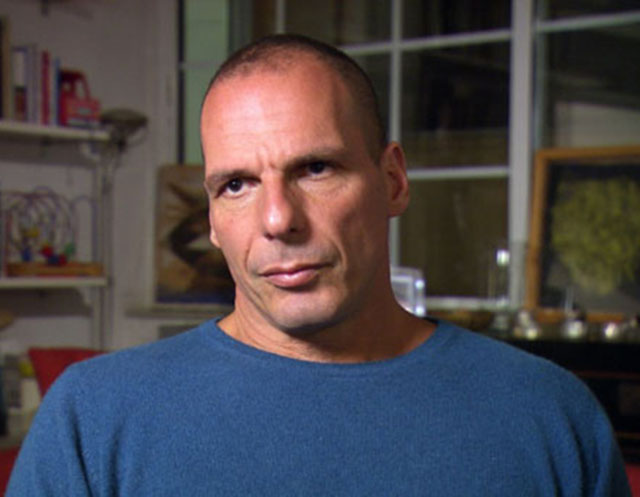
"Over the past year I have argued that Europe needs a jolt," notes Yanis Varoufakis showing his overwhelming support of Tsipras' candidacy for the presidency of EU Commission.
"And that there can be no better jolt than the election to the Presidency of the European Commission of a pro-European young leader, from the suffering Periphery, who is intent on keeping the Eurozone together by opposing (rather than acquiescing to) the European establishment’s failed, toxic policies. A leader who is keen neither for austerity nor for federal moves or cumbersome Treaty changes that will sap Europe of whatever energy it has left. Alexis Tsipras is such a leader and, for this reason, he has my support" concludes Varoufakis professor of Economics in Athens University.
The video below explains the reasons.
Originally published: http://yanisvaroufakis.eu/2014/05/01/my-endorsement-of-alexis-tsipras-candidacy-for-the-presidency-of-the-european-commission/

Working conditions in Greece have deteriorated over the last five years, according to responses given by 88 percent of Greeks replying to a Eurobarometer survey released on Thursday.
The survey was carried out to investigate the impact of the economic crisis on the quality of working conditions in the European Union.
Based on their responses, 82 pct of Greeks consider that working conditions in the country are "poor" (compared with 43 pct in the EU of 28 and 57% in the Eurozone) and only 16 pct consider them "good" (53 pct in the EU).
Next in terms of dissatisfaction with working conditions in their country are Hungarians (79 pct), the second place in the Eurozone area is taken by the Spanish (76 pct) and the third by Italians (73 pct).
An overwhelming majority of Greeks (88%) agreed with the statement 'Have working conditions in your country deteriorated in the last five years?' opposed to (57%) of EU citizens, while only (8%) consider that working conditions have not changed (27 % in the EU).
After Greeks, the Spanish (86 pct), Italians (85 pct), Slovenians (84 pct) and Portuguese (78 pct) had the highest rates of agreement for this question.
Greece is also the only EU country where less than half of the workforce are satisfied with prevailing working conditions, with 62 pct saying they are dissatisfied with conditions in their country, compared with 23 pct in the EU as a whole, and 38 pct saying they are satisfied, compared with 77 pct in the EU. After Greeks, the lowest rate of satisfaction with working conditions is among the Spanish (53 pct).
In terms of working hours, 63 pct of Greeks are satisfied on general lines (80 pct in the EU), and 36 pct are dissatisfied (19 pct in the EU). Rates of satisfaction with the balance of home and work life are also low, with 52 pct of Greeks dissatisfied (25 pct in the EU) and 48 pct satisfied (74 pct in the EU).
In reply to questions on whether they were consulted on changes in the organisation of their work or their conditions of work, 45 pct of Greeks replied affirmatively (54 pct in the EU) and 55 pct negatively (45 pct in the EU).
Just over half (51 pct) of Greeks said they had been informed about the financial state of their company or organisation and its future, including any possible restructuring (63 pct of EU citizens), while 48 pct said no (36 pct in the EU).
In terms of work-related hazards, 56 pct of Greeks said that the main danger to health and safety to which their work exposed them was anxiety (51 pct in the EU), 27 pct reported repetitive movements or bad body posture (28 pct in the EU) and 17 pct to accidents and serious injury (17 pct in the EU).
In addition, 53 pct of Greeks taking the survey said that staff in their workplace was not informed about health and safety measures (22 pct in the EU), 51 pct reported that measures to prevent health problems and workplace accidents had not been taken (37 pct in the EU) and 76 pct said that work places had not been adapted to older age groups (62 pct in the EU).
On the other hand 94% of employees in Denmark are content with conditions at their workplace while Austrians and Belgians are listed second and third on the list.
Source: EC-Eurobarometer


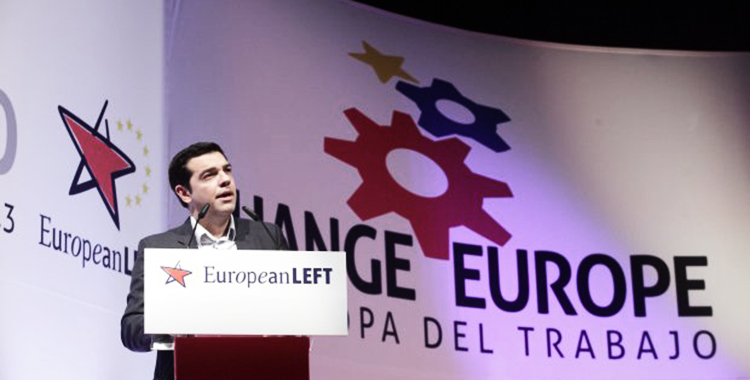
Alexis Tsipras, President of SYRIZA and candidate of the European Left for President of the European Commission, is due to visit Santiago de Compostela, the capital of Galicia, on Sunday April 27. Alexis Tsipras will speak at a rally organised by the Alternativa Galega de Esquerda (Galician Left Alternative in Europe) for the coming European elections in May.

Two GUE/NGL MEPs took part in a debate today on recent changes to Greek detention law which means asylum seekers can be detained for over 18 months, a clear violation of international law and even the already shameful maximum 18 month limit set by the Return Directive.
Greek GUE/NGL MEP Nikolaos Chountis called for a detailed response from the Commission on the issue and a revision of the Dublin convention, which he described as the heart of the problem.
"You know perfectly well that Greece and other countries take the brunt of migratory flows – solidarity can't just be a word. To address the issue of migration the Greek government has taken inhuman measures like the recent decision on prolonging detention," he said, calling it a "breach of national and EU law".
French MEP Marie-Christine Vergiat called the decision a "betrayal of so-called European values”.
"We want clear and stronger condemnation of these decisions from the Commission. It is urgent to avoid a contagious effect. If we are not moving towards real respect of fundamental rights, it is because member states do not want this and only want financial solidarity. The Commission should act as swiftly on this kind of violation as they do on economic matters," she said.
Originally published: http://www.guengl.eu/news/article/gue-ngl-news/commission-must-act-swiftly-against-violation-of-migrant-human-rights
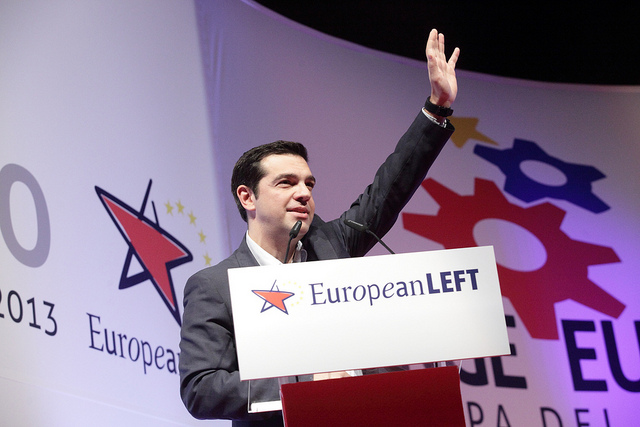
Politically independent Greek citizens have joined with members of SYRIZA and other social democratic parties to create a citizen’s initiative in Greece to support Alexis Tsipras’ candidacy for President of the European Commission.
The initiative was spurred by the highly symbolic nature of Tsipras’ nomination and because it transcends Party politics. Important not only for Greece, Tsipras’ nomination also resonates in a pan-European context. Therefore, the initiative seeks to generate widespread support for Tsipras’ candidacy. More details regarding the will be announced shortly. The declaration of the initiative can be found below.
Declaration
Now is the time of the European Left
Europe is in the throes of crisis
A general sense of distrust pervades Europe’s path toward integration. The dynamic that transformed post-war Europe has ceased to exist, and its effects are slowly unraveling. More and more, European citizens feel disillusioned by the political deal-making that affects their future that’s shrouded in secrecy and without democratic legitimacy. National parliaments, as well as European institutions, have become puppets of the German Chancellor, who makes the major decisions. The European Central Bank now has greater power than the European Parliament. The justification for the resulting social and democratic degradation is that Europe must become more competitive in order to compete with the emerging global powerhouses.
The high numbers of unemployed—26 million people—are indicative of the fact that Europe, as whole, is facing a recession. Worker protections are slowing eroding. Social services are being cut, straining under the weight of the fiscal crisis, while governments increasingly become more authoritarian. European integration and cohesion seem to be a thing of the past, no longer the focus of discussion. Europe has ceased to take international initiatives or engage in international political matters. Europe is notably absent in regulating the affects of globalization, allowing market liberalization and technological advances to erode the social and democratic gains of European citizens. Meanwhile, fascist and Nazi movements are on the rise, as well as racism and xenophobia.
The European Union should strengthen its global standing, and serve as an example of stability, peace and justice. Otherwise, there will be fewer and fewer differences between Europe and its competitors.
The Left’s vision for Europe
It's time for the Left to mobilise
The Left must engage the European community, which has been built on the ideas and struggles of the Left and related social movements.
It must stand against right-wing Euroscepticism and the resurgence of Nazism and fascism.
It must strive to re-democratize the decision-making process in the Europe Union, and strengthen the regulatory oversight of the European Parliament and its decisions. European treaties and debt agreements must be renegotiated. Greater respect for the environment must be incorporated into industrial production. Immigration reforms must be put into place.
The European Union, or the shared currency zone of the Union, should operate an EU budget approved by the European Parliament and based on a “New Deal” that modern Europe desperately needs. This budget will replace the funding programs and Memoranda that promote neoliberalism and are not transparent, and instead will support disadvantaged economies and social groups, including young people.
The Left is in a position to chart a new path, and show that an alternative approach exists; one that focuses on prosperity and lessens alienation and suffering. European integration cannot work without functioning societies, cohesion and convergence.
Tsipras’ candidacy, a proposal for hope
A peaceful, mass movement that will redefine the EU’s and the Eurozone’s objectives and operations is needed.
The European Left will be bolstered by a win in the upcoming European elections, allowing the Left to dismantle austerity policies while strengthening the forces resisting the division of Europe based on socioeconomic classes.
For the above reasons we support the nomination of Alexis Tsipras for President of the European Commission.
We believe that Tsipras’ candidacy for President of the European Commission:
Transcends party politics and is an important opportunity for Greece to take its rightful place in European affairs.
Has deep symbolic meaning, even beyond Greece and SYRIZA, for the emergence of a strong European south and a strong European Left that will create a Europe based on citizen’s needs, putting an end to the “Germanification” of the EU. This can already be seen in the formation of the Italian party, “Another Europe with Tsipras.”
Strengthens the prospects for Greece to implement an alternative policy to the Memoranda within the framework of the EU, and allows for the renegotiation of the loan agreement with our lenders and partners.
Promotes the long forgotten idea of European solidarity and reinstates the acquis communautaire.
Historically, the Left has predominantly been a European power. Without the Left, Europe risks a future that will not be European.
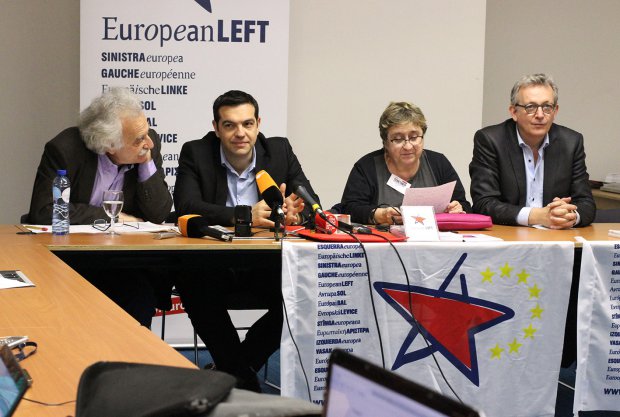
The Party of the European Left (EL) called last Thursday, in an International Conference in Brussels, for the cancellation of a part of an odious debt for many countries of southern Europe. They did so in the Conference titled "Together we can put an end to debt and austerity problems in Europe" where economists, sociologists, politicians of the European Left, trade unionists and members of the social movements of more than 20 countries of Europe and Latin America joined forces. During a 10 hour debate day, they analysed the causes, targets, experiences and proposals in order to jointly prepare a social solidarity and united alternative economic policy for the left.
The aim of the Conference, as marked the president of EL, Pierre Laurent, was to explore the alternatives to solve the problem of the debt and stop the austerity policies.
During the day, the speakers spoke against neoliberal thinking that underpins austerity as the only possible alternative, and exposed a wide set of proposals showing the rationality and feasibility of a social economic alternative of the left.
Pierre Laurent said that to raise the debt issue and to question the whole economic system of the financial markets and institutions that support it shall stop being a taboo, for it to turn into the centre of the debate. And the conference followed this logic.
In the analysis of the causes and consequences of the generation and increase of the sovereign debt as well as the politics of austerity the manner of how the debt is used to dominate other peoples, to blackmail them and to provoke external and internal imbalances, was denounced. Also the target which is behind that policy was pointed out: to transform the south of Europe into an area of cheap and deregulated labour without rights.
Proposals for a left economic model
The set of proposals that have been discussed throughout the day are based on four main pillars, described by Pierre Laurent as: ending the policy of austerity; the cancellation of a big part of the public debt; the creation of a new financial institution which funds public services by mobilizing the financial resources of the ECB; and the restoration of democracy in Europe with changes in the financial and business systems.
From this basis, other measures were developed such as the change of the missions and role of the European Central Bank, which has been offering loans to the private banks without any change in the financial system, while the private banks lend money to States at 5% of interest. One of the proposals is precisely that the ECB buys a part of the States debt and could lend directly to States in order to fund the development of public services “without imposing anti-social conditions” as they are doing with the states that have received financial aid. The European left asked that only the ECB refinance banks at a low cost when they give credit to companies with “social and environmental” criteria.
European Fund for social and ecological development
The alternatives of the EL are backed by a solid financing Project called European Fund for social and ecological development that would be used to finance public services and the creation of employment at interest rates to almost zero. The Fund may also finance projects of local authorities and social actors.
Other measures that have been presented from more than 50 speakers from Europe and Latin America, were the fair taxation, taxes on financial transactions, wage increase, the democratization of financial institutions, sustainable re-industrialization, put an end to tax havens and, of course, the audit of the "illegitimate" debt.
Pierre Laurent announced that they will work with these proposals in the electoral campaign for the elections on May 25 and requested the organization of a European Convention on debt and public investment in order to solve the problem of the debts of countries in difficulty, so that some part of that debt will be exonerated, and the review of the conditions for the payment of interest.
The Party of the European Left advocates for the remodelling of the European financial institutions
Pierre Laurent: "It is necessary to restructure the debt to lighten it”
– See more at: http://european-left.org/positions/pierre-laurent-asks-european-convention-debt-and-public-investment#sthash.zQkAXZ6l.dpuf
Angela Merkel’s visit to Athens coincided with a chain of protests across the European South. Tens of thousands of protesters in France, Italy, Greece and Spain mobilized showing their support for the Left, and demanding an end to austerity and the neoliberal policies choking Europe. Alexis Tsipras, the President of SYRIZA and candidate of the European Left for President of the European Commission, commented that, "Merkel's arrival in Athens, the capital of the Memoranda, highlights the drastic results brought about by those who've turned Europe into a tool of the market."
While Merkel and her allies celebrated the success of the Memoranda in Greece, and the austerity-spurred reforms across Europe, hundreds of thousands of demonstrators protested on April 11, 2014 in Paris, Rome and Barcelona condemning austerity and calling for the governments of Samaras (Greece), Hollande (France), Rajoy (Spain) and Rentzi (Italy), that continue to employ the “German” solution to the economic crisis, to step down.
In Paris, Alexis Tsipras, marched alongside Pierre Laurent and Jean Luc Mélenchon after the opening of the campaign of the Front du Gauche. Chanting, “Contre l’austérité, pour l’égalité et le partage des richesses” (against austerity, for equality, and sharing wealth), protesters marched from the Place du Republique carrying banners stating, “Enough with Hollande”. "Our Europe is the antithesis of neoliberal policies and authoritarianism, it is the Europe of democracy and social protections," stated Tsipras.
[widgetkit id=3]
In Rome, protesters took to the streets to protest the decimation of benefits, high housing costs and unemployment that have plagued the Italian economy, and are poised to worsen under the neoliberal reforms Renzi is seeking to implement.
Further angering and confounding protesters, both Hollande and Renzi are center-left politicians who are allying themselves with the policies of Merkel and the conservatives, rather than those of their socialist traditions. In Barcelona, the conservative Rajoy government found itself once again at the epicenter of protesters’ anger. The Spanish have repeatedly mobilized against unemployment, loss of pension and other benefits and bank foreclosures that are forcing thousands from their homes.
The drastic effects of austerity on society are unifying people ahead of the European elections this May. The protesters are uniting behind the Left, and its commitment to ending austerity and creating a Europe for the people, not special interests. Channeling the energy of people across the European south, Alexis Tsipras stated, "The European Left seeks to foster a progressive Europe that values citizen's rights, culture and growth. In the last several years, we've seen mass mobilizations and resistance to the policies of the elites, calls for direct democracy and the end of the Memoranda, Troika and the fickleness of the markets. We're committed to defending the public sphere and public assets from speculators."
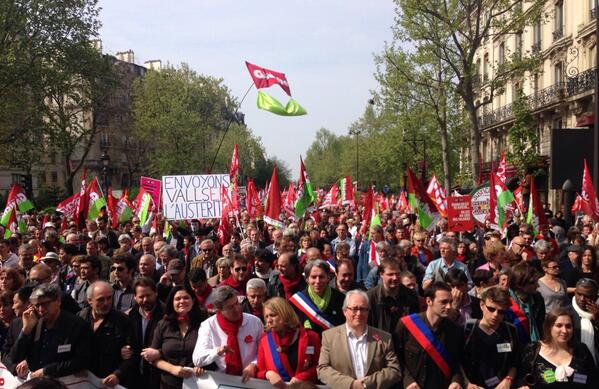
A mass demonstration, “Contre l’austérité, pour l’égalité et le partage des richesses” (against austerity, for equality, and sharing wealth) is taking place in Paris, organized by the French Left. Alexis Tsipras, President of SYRIZA and the European Left's candidate for President of the European Commission, is marching alongside the crowds, as they protest against the austerity policies of French President François Hollande, and those in place across Europe.
Read more here:
http://www.humanite.fr/le-debut-de-la-longue-marche-necessaire-contre-lausterite http://www.lemonde.fr/politique/article/2014/04/12/manifestation-anti-austerite-a-paris_4400339_823448.html http://www.liberation.fr/politiques/2014/04/12/des-milliers-de-manifestants-a-paris-contre-l-austerite_996136
